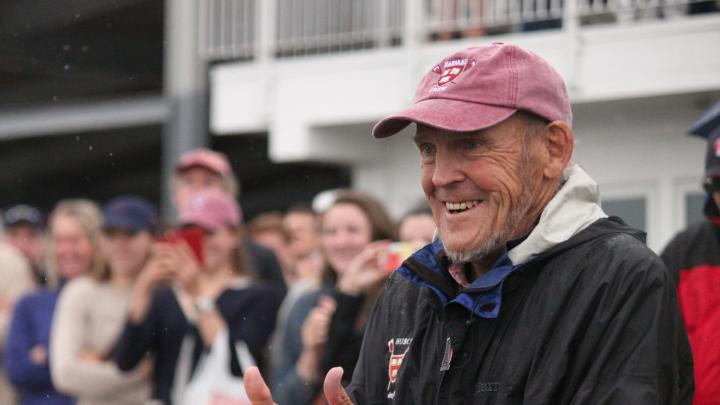Harry Parker, head coach of the Harvard men’s heavyweight crew for the past half-century, died on June 25 at age 77. The cause of death was myelodysplastic syndrome, a form of blood cancer; Parker was diagnosed in 2011. His passing marks the end of an era in college rowing.
In 51 seasons as mentor to the Crimson heavyweights, Parker compiled an unparalleled record. His crews’ overall winning percentage—above .800—is probably unmatched not only by any other rowing coach, but by any longtime coach in any intercollegiate sport. Under Parker, Harvard crews logged 22 undefeated seasons, 24 varsity titles at the Eastern Association of Rowing Colleges Sprints, 21 JV sprints titles, and 16 national championships, both official and unofficial. In his first season at the helm, after taking over the program due to the sudden death of head coach Harvey Love in 1963, Parker’s varsity crushed Yale by eight lengths in the annual Harvard-Yale boat race, beginning a streak of Crimson victories that lasted 18 years, until 1981. Parker’s overall record in that race was 44-7; he finished out his career with six straight sweeps of Yale in varsity, JV, and freshman events.
Obituaries in the Boston Globe and Harvard University Gazette marked Parker’s passing, a notice on the Harvard Athletics website offered a thorough summary of his career, and the row2K website published a tribute. A 1996 cover article in Harvard Magazine provides an in-depth profile of Parker as a person and coaching genius.
Parker shared his talents in many venues beyond Harvard. After rowing as the U.S. single sculler at the 1960 Rome Olympics (he finished fifth), he coached U.S. crews at the Olympic Games from 1964 until 1984. In the mid 1970s, he became one of the first coaches of the U.S. national women’s crews. In 2008, Boston’s Community Rowing program named its new boathouse in his honor, in acknowledgement of his support for public access to rowing on the Charles River. In 2012, Harvard awarded him a Harvard Medal in recognition of his years of stellar service to the University; it cited him for “instilling in your student athletes lessons of courage, determination, and strength that have led to success, not only on the water, but in their lives.”
Parker regarded himself as a teacher, and many of his athletes called him the most important teacher they had at Harvard. “He influenced the trajectory of my life like no other,” said former varsity coxswain Jim Crick ’88. “I had no idea what my potential could be until he taught me how to find it.”
In a tribute, Harvard president Drew Faust emphasized that quality as well: "Harry Parker epitomized the coach as teacher. He saw each of his rowers not just as an athlete but as a whole person, a person learning not just how to excel at a sport but how to live a life. Generations of Harvard students will forever remember his formative influence. He was a living legend at Harvard and in the world of rowing, and his legend will long endure." Jack Reardon ’60, executive director of the Harvard Alumni Association and former director of athletics, noted that “Harry was one of Harvard’s most illustrious coaches and he may have been the greatest college crew coach of all time. In any chosen profession, there are people who are very good and there are people who are the best. Harry Parker was the best. Harry’s rowers revered him. He was a man of few words but those words counted, and he inspired his athletes to do better than they thought possible. There will never be another Harry Parker. I will miss him and Harvard will miss him.”
Characteristically, Parker went out at the top of his game. In 2011, Harvard’s crew won the championship eights at the Head of the Charles Regatta for the first time in 34 years, then took home the Ladies Plate at the 2012 Henley Royal Regatta with a late surge that won the final by a single foot. This year’s crew went undefeated in the regular season, won the Eastern Sprints, and finished second to Washington in the Intercollegiate Rowing Association national championship regatta before beating Yale by six lengths in New London.
Parker was out on the Charles River only a couple of days before his death, taking part in a reunion row of the 1980 U.S. Olympic eight, a superb crew he had coached but which was unable to compete in Moscow due to the U.S. boycott. In a coaching launch, as usual, Parker was laughing and enjoying himself with this group of athletes who had, like so many of his charges, become lifelong friends. Seeing his daughter Abigail, a rising freshman at Harvard, stroke one of the reunion boats no doubt helped buoy his good spirits.
Calling on a phrase rowers use for the forward momentum of a boat after the oars leave the water—one that Parker himself used— Crick probably summarized the feelings of thousands of Parker’s oarsmen on his passing: “Let ’er run, HP.”








